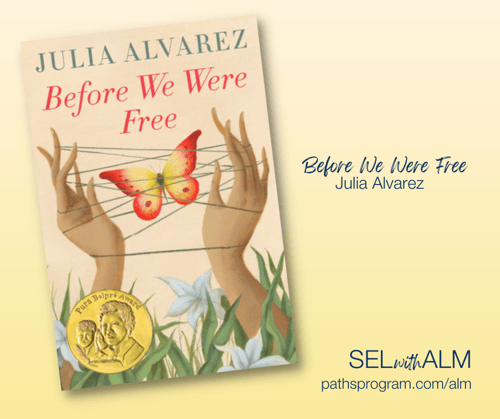Before We Were Free is a Pura Belpré Award-winning novel by Julia Alvarez. It contains themes of courage and sacrifice as well as relatable teen topics of first love, friendship, and family. This post explores how these themes connect to the CASEL SEL competencies and can be adapted to use within each grade of the Emozi® Middle School Socratic Seminar activity.
Overview
Before We Were Free by Julia Alvarez is a story about a twelve-year-old girl named Anita de la Torre who lives in the Dominican Republic in the 1060s during the Trujillo dictatorship. The story begins with her cousins leaving the Dominican to move to the United States and we eventually discover that her family is involved in trying to remove the dictator from power. Anita's experiences teach her about courage and sacrifice as well as relatable teen topics of first love, friendship, and family.
Socratic Seminar Questions
Chapter 1
"Just staring at El Jefe keeps my tears from flowing. I want to be brave and strong, so that someday if I ever meet the leader of our country, he'll congratulate me. 'So, you are the girl who never cries?' he'll say, smiling down at me." p. 4
- What do you think of people who cry? Are people who do not cry or show how they feel strong?
"That's my nickname in the family because sometimes I talk too much, like a lttle parrot, Mami says. But then at school, I'm the total opposite and Mrs. Brown complains that I need to speak up more." p 4.
- Why might Anita act differently at home vs school?
- Are there places where you are very different? How are you different and why?
Chapter 2
"'Anita, por favor,' Mami pleads, collapsing in a hall chair. She leans forward and whispers in my ear, 'Please, please, you must stop asking questions.' p. 18
- How do you feel when adults don't tell you what is happening? Why do you think adults do that? Is it worse or better not to know?
"That night, I replay his compliment over and over in my head. It's the nicest thing that has happened to me in weeks." p. 22
- How do you feel when you receive a compliment? How often do you compliment others? How do you think they feel?
"...we promise not to tell our parents about our discovery just yet or they won't let us explore the compound anymore." p. 25
- Is this a good decision not to tell? Why? What might be happening that maybe their parents should know about? When is it a good idea to keep things to yourself rather than tell? When is it not? How do you decide?
Emozi® Lessons that Connect to Before We Were Free
Grade 6
Unit 1
- Lesson 2: Understanding and Building Self-confidence and Self-esteem
- Lesson 10: Decision-Making
- Lesson 12: Responsibility and Accountability
Unit 2
- Lesson 1: Self-perception
- Lesson 2: Optimism
- Lesson 3: Grief
- Lesson 6: Diversity
Unit 3
- Lesson 1: Resilience
- Lesson 3: Fear Less
- Lesson 8: Cultural Competence
- Lesson 12: Perseverance and Hope
Grade 7
Unit 1
- Lesson 3: Strengths and Weaknesses
- Lesson 7: Morals
- Lesson 12: Self-perception
Unit 2
- Lesson 5: Fear
- Lesson 7: Overcoming Obstacles
- Lesson 11: Cultural Competency
- Lesson 12: Empathy
Unit 3
- Lesson 1: Dealing with Disappointment
- Lesson 2: Stress Reduction
- Lesson 7: Resilience
- Lesson 9: Being Responsible
Grade 8
Unit 1
- Lesson 4: Problem Solving
- Lesson 5: Cultural Competency
- Lesson 7: Belonging and Rejection
- Lesson 10: Ethics and Integrity
Unit 2
- Lesson 9: Conflict
- Lesson 10: Apologies and Forgiveness
- Lesson 12: Loss
Unit 3
- Lesson 2: Happiness
- Lesson 11: Standing Up for Yourself
- Lesson 12: Transitions
For the Socratic Seminar for this novel and full lesson plans for the topics listed, please check out our website for more details on how to get Emozi® Middle School for your classroom!


